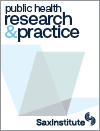Public Health Research and Practice
Volume 35
Number 3 2025
Involving young people in the development of health interventions can result in interventions that are more fit for purpose. However, few, if any, studies outline how to successfully and meaningfully engage young people in the development process. This report outlines the successes and challenges of three strategies we used to involve young people in designing a health intervention targeting young people. It is hoped that our experience can help inform other researchers how young people can be meaningfully engaged in research.
The term ‘culturally and linguistically diverse’ stems from historical social categorisation that divides the Australian population into positions of ‘them’ and ‘us’. The use of the term as a standard language in health literature and public discourse has increased dramatically. With the popularity of the term and the normalising of its use, the potential for harm to social cohesion, individuals and groups is heightened. As public health researchers and practitioners, we should refrain from continuing to use this term.
This study examined how much local governments in Australia are considering health when planning for climate change. In 2023, only 23% of local governments had a climate change adaptation plan, but all plans mentioned health. Although implementation of these plans will likely reduce the risks of climate change for health in these local government areas, which tended to be urban and more advantaged, there is an opportunity for other local governments to develop plans that address the health risks.
Public health relies on a diverse workforce to address global health challenges, yet many students face uncertainty about career options. This study analyses the career paths of over 14,000 public health graduates, revealing key employment sectors, major employers and essential skills. By tracking alumni through networking sites, institutions can refine public health education to align with workforce needs, ensuring graduates are well-prepared for impactful careers.
Few studies have examined in detail the funding invested in addressing violence against women despite its importance for achieving global elimination targets. This review of Australian Government budget reports found increasing funding over time, with resources directed towards strengthening the response to violence. Documenting a long-term, need-based strategy is necessary in the future to ensure adequate resources and optimal investment in comprehensive strategies to address violence against women effectively.
This Editorial highlights recent publications included in the 10th anniversary collection of Public Health Research & Practice. The collection offers reflections from our Editorial Board members and other invited experts on several critical public health issues from the past 10 years, while also looking to future opportunities and challenges.
This article belongs to the collection: A Decade of Insight: 10th Anniversary Collection of Public Health Research & Practice.
Government-organised bowel cancer screening, using Faecal Occult Blood Tests, is a proven public health method for early detection and demonstrates high efficacy in reducing population morbidity and mortality. Despite the positive influence general practitioners have on their patients’ screening participation rates, endorsement is not routinely included within policy and practice. Research findings contribute new evidence regarding the resources, preferences and system-level requirements needed to support routine general practice endorsement of bowel cancer screening.




